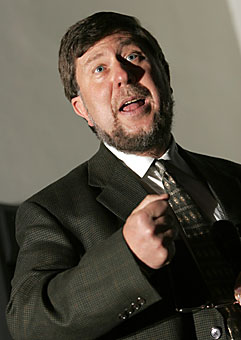 |
|
EVAN CARAVELLI/Arizona Daily Wildcat
|
History and political science professor David Gibbs explains his belief that the Pentagon was in search of a new villain after the end of the Cold War, and found it in terrorism and the attacks of Sept. 11, 2001.
|
|
|
By Troy J. Acevedo
Arizona Daily Wildcat
Monday, March 28, 2005
Print this
A forum Thursday marking the second anniversary of the war in Iraq was held to discuss the complexities of the United States occupation in Iraq - past, present and future.
A crowd of about 100 gathered in the auditorium of the Social Sciences building to listen to the opinions of three UA professors and their expertise on the controversial topic.
"The U.S. has offensive objectives. Officials were not reluctant to use force, but waiting," said David Gibbs, associate professor of history and political science. "The public is reluctant to use force initially until they have proof of hostile actions."
Intelligence methods were discussed in relation to both the current situation in Iraq and previous governmental incidents, such as President Jimmy Carter and Afghanistan in 1979 and its continuity in "The War on Terror" in 2001. These were all cited as examples of pretexts used by U.S. policy makers to create a new villain in order to allow for additional weapons spending, Gibbs said.
"The intelligence used by the Bush administration was known to be incorrect," Gibbs said. "This is an era of pretexts. Pretexts are the norm in U.S. foreign policy."
The rapid push to establish a functional democracy in Iraq was addressed in detail and the fact that popular participation changed in the new and old Iraq.
"Elections do not make a democracy. Make the Iraqi people feel like they are able to make a difference," said Maggy Zanger, an associate journalism professor.
Having had an opportunity to become immersed in the culture of Iraq, Zanger said she was able to gain a unique insight to the Iraqi people, who often discussed wanting to participate, but not being allowed to by the powers that be.
Zanger also touched on how the Iraqi people believed the end of the regime would be the beginning of hope, but instead, Zanger said, they have a U.S. version of how Iraq should be.
"The only surprise about the Iraqi elections was the surprise over the turnout," Zanger said. "The people want to play a role in the formation of their country."
Chris Demchak, associate professor at the School of Public Information and Policy, talked about solutions and how to structure a new Iraq toward hope for the newly forming democracy, including a three-state solution, separating the country into thirds, and a split between the three major power concentrations in Iraq.
Focused on the distribution of potential resources in Iraq, Demchak said instead of trying to force these different cultures into one government, they should be allowed autonomy and make Iraq a three-state government.
"We need to offer the people of Iraq a solution that means more then what we are offering right now," Demchak said.
Although students seemed to be interested in the second-year anniversary of the war, some said were unsure why it was an event to be celebrated.
"Why are we celebrating war?" asked Apurva Patel, a finance junior. "People are still dying on both sides and we think that this was a victory, it honestly makes no sense."
Vishal Patel, a finance senior, said she thinks the anniversary should be celebrated by reasoning of the troops, not the U.S. government's decision making.
"The anniversary should be celebrated only for the dedication of the troops and their willingness to do their duty, not for the poor decision of the administration," Patel said. "President Bush's decisions show a lack of moral judgment and seem to be driven by an egocentric ideal."
But not everyone felt the president and his supporters made an error in their decisions to liberate the Iraqi people from the reign of Saddam Hussein.
Lessa Greenwood, a senior majoring in English, said she was confident in the Bush administration's reasoning for going to war, but said she also felt "celebrating" the war was questionable.
"I believe that Bush made his decision with the best interests of the Iraqi people in mind, but I don't think we should celebrate the war," Greenwood said. "Instead, we should celebrate the accomplishments."
